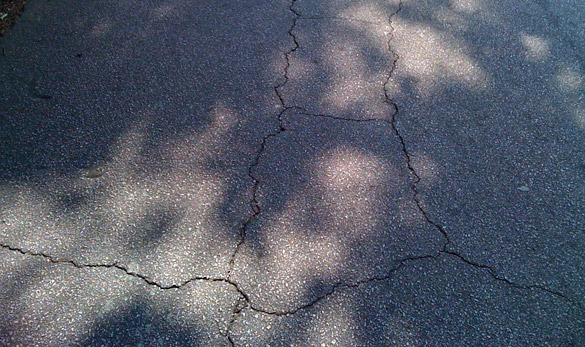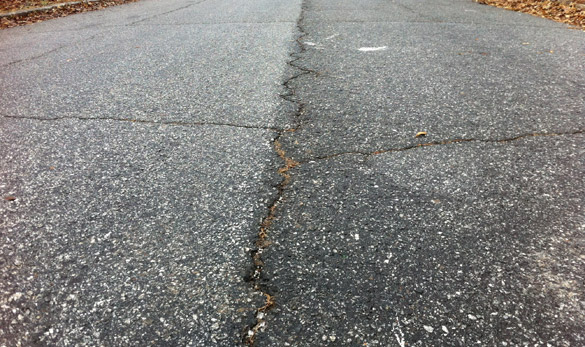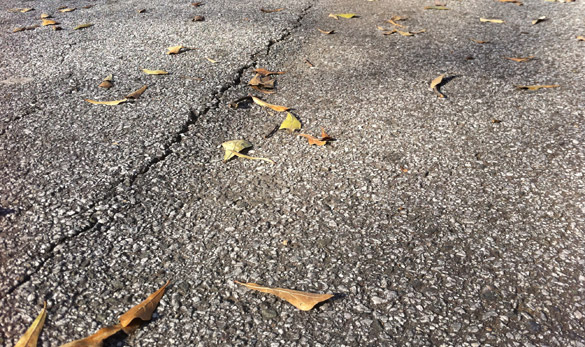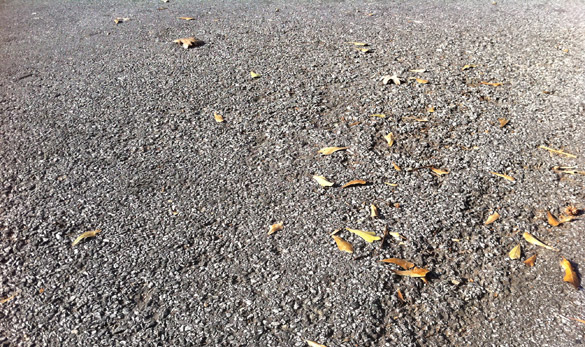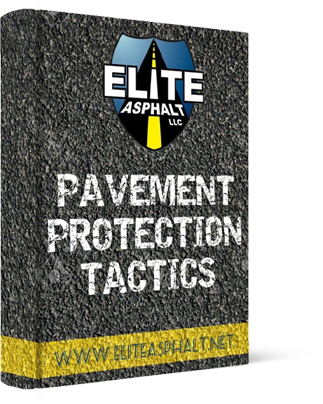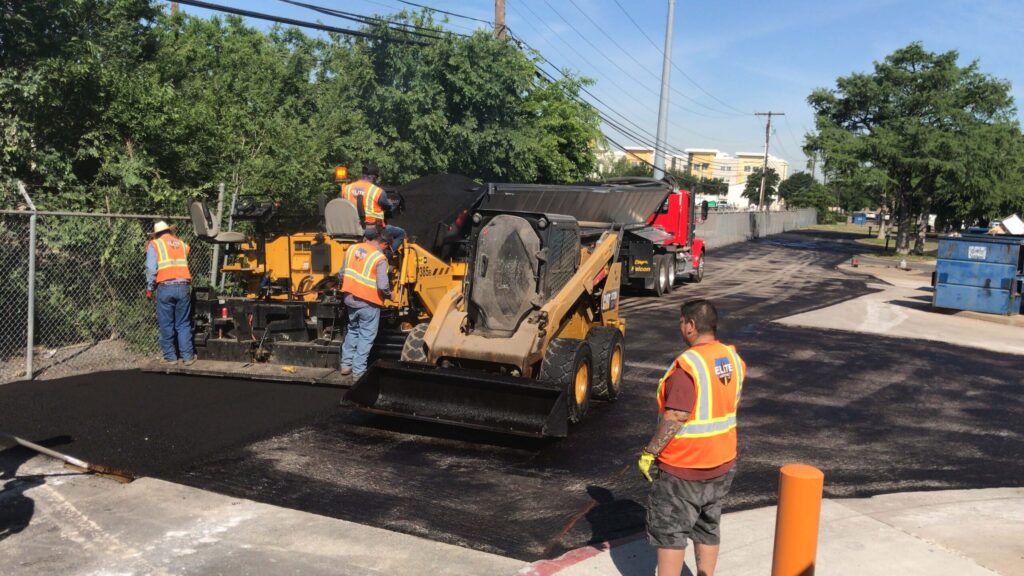
Are you a commercial property owner and wondering whether it is time to install an asphalt parking lot or driveway on your property? The first impression that visitors, clients, or potential customers have is important and occurs the moment they arrive. Poorly maintained roads and parkings lots can give clients a negative impression right from the start. The good news is that a nice parking lot or entry roadway can also give visitors a good impression of your business as well
This is one of the reasons why an asphalt roadway and/or parking lot is critical to the success of commercial businesses. We at Elite Asphalt have been commercial asphalt contractors for over 30 years and understand this truth. Whether you are considering hiring an asphalt paving contractor or doing some preliminary research for a future project, here are 8 benefits to commercial asphalt that you should know.
1. A Great First Impression
As we stated at the beginning, the entry road and parking lot are the very first thing that visitors see when they drive in or pass by your business. Is your current driveway or parking lot in poor condition and could benefit from repairs or a complete makeover? You don’t need to let your old road or parking lot with potholes and cracks keep business away! A new asphalt roadway or parking lot can give a professional, clean look if done by experienced asphalt contractors.
If you’re a commercial business, a new asphalt parking lot or entryway is an excellent investment to give a great impression right from the start.
2. Saves Your Business Money In The Long Run
Asphalt is a great investment for your business. It’s a quality product that can last for years to come if properly maintained. Whether you’re getting a pothole filled, a patch on a cracked section of a parking lot fixed or even starting with a fresh installation, if done right, asphalt can last a surprisingly long time.
This is one of the big benefits of commercial asphalt. It can last for years. When looking for an asphalt contractor to hire, it is important to hire one with the skill, expertise, and experience to do the job properly to ensure that the asphalt lasts for a long time. An experienced asphalt contractor will make sure the installation is done properly. This includes correctly installing a drainage system so that water doesn’t pool up and eventually ruin your asphalt.
In addition to a professional installation, asphalt maintenance will also help keep your asphalt looking good and lasting for years to come.
3. Simple Maintenance
As we said earlier, maintenance is necessary for keeping your commercial asphalt in good condition. Ensuring that your asphalt has no standing water or sitting debris can help stop your asphalt from cracking or developing potholes. If you neglect cleaning or maintenance, plants can grow in cracks causing damage that will need to be repaired at some point in time.
With this said, maintenance of commercial asphalt is relatively simple and easy. By removing dirt and debris you can keep your commercial asphalt looking good and lasting for a long time. You can do this yourself or hire out to do this work. Elite Asphalt offers asphalt maintenance services to make sure your asphalt is kept clean and lasts for a long time.

4. Commercial Asphalt Installation is Quick
Once you’re ready to have asphalt laid on your commercial property, the process is quick. The asphalt paving contractor will gather details about the amount of traffic you expect, the environment, the size of the project, etc.. The contractor will visit the site to make sure all details are collected so that they can come up with a plan.
Once permits are collected, plans are made, the asphalt contractor will determine the right day to begin laying the asphalt to help make sure that your business is disrupted as little as possible. Depending on the size of the project will determine how quick the job is done, but overall compared to other types of construction projects, commercial asphalt jobs can be done very quickly.
5. Commercial Asphalt is Durable
One of the benefits of commercial asphalt is that it’s durable. In Texas, the weather can be harsh and deteriorate and break down materials quickly. Between heavy rains, cold temperatures, and hot summers asphalt can withstand harsh environments. You can even give asphalt a longer life by applying sealcoating to it to protect it even further from weather and traffic.
6. Choosing Commercial Asphalt is Choosing Eco-Friendly
More and more businesses are going green and eco-friendly, and deciding to go with asphalt is one way to be eco-friendly. How’s that? Asphalt is the most recycled material in the United States.
About 80% of the asphalt removed from road projects is recycled and reused for other projects. So not only is asphalt durable and affordable, it’s a great way to help our planet and be eco-friendly.
7. It’s the popular choice – and for the right reasons.
Asphalt is used by many commercial businesses, because of its durability, cost, and reusability. It is no surprise that it is a popular choice for commercial companies. Studies show that over 85% of parking lots are paved with asphalt.
It’s also a top choice for roads with millions of miles of roads and highways within the United States being paved with asphalt. Asphalt is used for roads, because it is the right balance between price and durability. For an economical price you can get long-lasting roads that can withstand a lot of traffic and harsh weather. As we’ve said earlier, in order for asphalt parking lots and roads to last a long time, you’ll need to make sure it’s installed by a professional commercial asphalt paver.
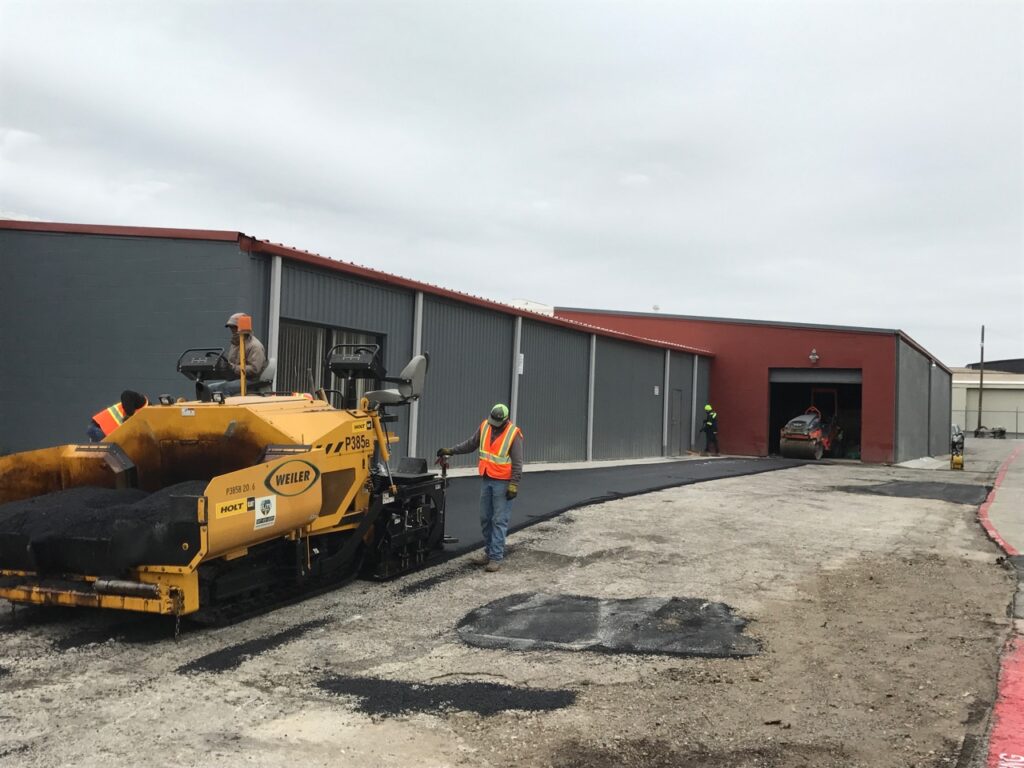
8. Ability to Add a Professional Shine To It
Once asphalt has been poured you have the option for sealcoating. Sealcoating protects the asphalt from weather conditions, moisture, oils, chemicals, and the sun. But not only is it protective, it is also a way to give your asphalt a professional finished look to it. We highly recommend getting your commercial asphalt finished with sealcoating for protective and aesthetic reasons.
More Questions You Have About Commercial Asphalt
Does commercial asphalt have more uses than parking lots? Commercial asphalt has many more uses than only for parking lots. Commonly asphalt contractors use asphalt for parking lots and also for roads. While these are the most common uses it can also be used for walkways, basketball courts, and other paving projects.
Should a commercial business choose asphalt or concrete? There’s pros & cons to both asphalt and concrete. One of the benefits to asphalt is that it’s less likely to crack compared to concrete. If you’re looking for an affordable AND durable material you’d be best off choosing asphalt.
Your Go-To Commercial Asphalt Pavers in Texas
One size does not fit all when it comes to commercial asphalt installation. That’s why Elite Asphalt LLC takes the time to assess your property and discuss your needs and goals with you. We want to make sure that you get the right parking lot or driveway options, not just the fastest or most expensive solutions. We’ll work with you to identify exactly what you need when it comes to sealing maintenance, chip seal driveway installation, or parking lot striping, and then we’ll work carefully to implement those services precisely.
It’s that attention to detail that can make a huge difference in your overall satisfaction with the result, so our commercial asphalt paving contractors make sure to go above and beyond to take great care of you and your property.
Ready to learn more about what Elite Asphalt LLC can do for you? Contact us now for a free estimate or to find out more about our commercial asphalt paving company.








